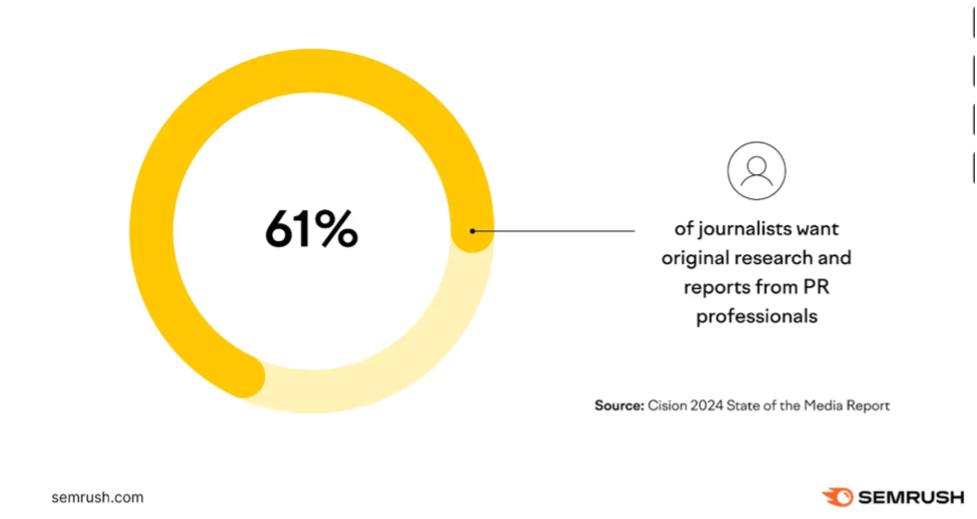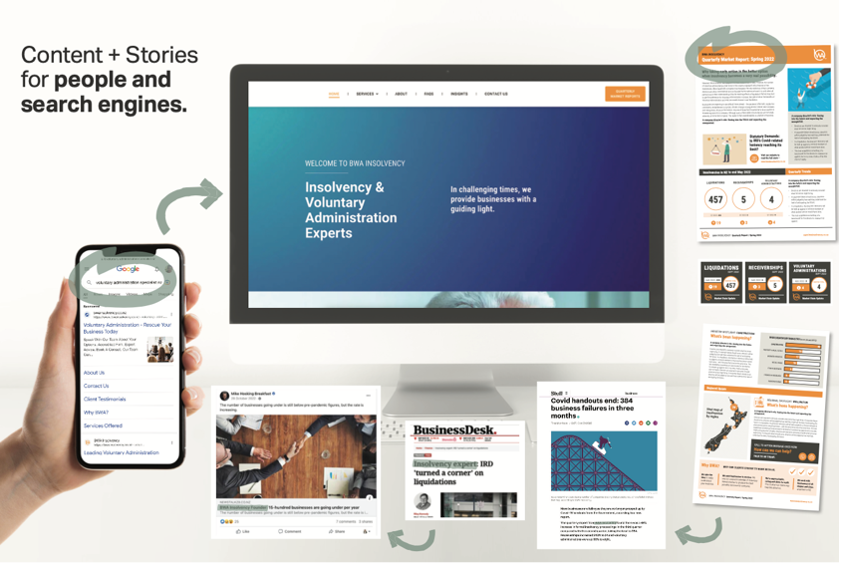Lately, Digital PR has been significantly impacted by big changes in the world of SEO, digital news, and now, AI. As we witness the seismic shifts that AI is causing in the way we search and discover information, we are also seeing Digital PR evolving alongside it. In this article, we examine the importance of Digital PR as AI’s increasing demand for authoritative and unique content creates new opportunities to build brand authority and give you our top five ways to win at PR in 2025.
Key Takeaways
- Google’s AI Overview is reducing website clicks, but brands featured in AI responses are seeing higher-quality traffic and better conversion rates.
- Google’s AI tools and LLMs such as ChatGPT prioritise earned media coverage from trusted publications, making Digital PR more valuable than traditional SEO tactics.
- New Zealand newsrooms are operating with smaller teams, which is creating opportunities for businesses that can provide high-quality, ready-to-publish content and genuine expertise.
- Original research, credible media mentions and relationships with journalists are critical for AI visibility, all things Digital PR specialises in.
What is Digital PR? (and why it matters more than ever)
Digital PR is traditional public relations supercharged for the internet age. It is a tactic that builds your brand’s authority and visibility through online media coverage, high-quality backlinks, and positive brand mentions on digital channels.
Digital PR focuses on creating compelling stories and valuable content that journalists, bloggers, and influencers want to share.

When Stuff.co.nz or NZ Herald quotes your company CEO, you’re not just getting exposure, you’re earning digital “votes of confidence” that Google treats as gold standard credibility signals.
Unlike paid advertising that disappears when the budget runs out, Digital PR builds over time with every quality media mention building your domain authority, pushing you higher in search rankings and making future coverage easier to earn.
Real Results: Digital PR Case Study
The BWA Quarterly Market Report
The work we do with our client, BWA Insolvency, shows Digital PR in action. Each quarter, BWA publishes a report of original data on New Zealand insolvency trends. Because of the value of this content, the report consistently earns coverage across multiple media outlets, with each report typically generating 6-8 media mentions, multiple shares, and media interviews with BWA’s principal. Over 12 months, the report has increased web traffic by 184% and improved BWA’s domain authority.

The icing on top of the Digital PR cake is measurement tracking. Digital PR enables performance tracking using tools like Google Analytics or SEMrush revealing vital metrics such as DA growth, Google rankings, referral traffic and website conversions.
The AI game-changer: How everything just shifted
Google AI Overview
Google’s AI Overview works by generating a clear, high-level summary that directly answers detailed queries, saving the user time and offering a jumping-off point for further research, all within the search results page. Instead of showing ten blue links, it gives users immediate answers, often without them needing to click through to your website.

Early data shows AI Overview is impacting click-through rates, with a recent study from Growth SRC revealing a 32% decrease in organic click-through rates for sites in position #1. While there is a lot of debate around the specific impact of AI Overviews, it seems most agree that there is higher zero-click behaviour when AI Overviews are triggered.
What is Google’s AI Mode?
While we have all been seeing Google’s AI Overview on our browser since 2024, Google’s AI Mode will take things one step further when it is rolled out. (Google AI Mode is already operating in US browsers.) Think of AI Mode as Google’s “super-smart assistant.” When someone searches “best coffee in Auckland,” it creates a summary pulling details of top cafes from trusted sites like NZ Herald or TripAdvisor, all without sending traffic to those sites, similar to how we currently use ChatGPT.
There is now a new goal in search: You’re winning if Google’s AI mentions your brand in its answers and you’re missing out if it doesn’t, even if you rank #1 in traditional search.
The new winning formula appears to be about ensuring your brand is featured in the AI’s answer, whether through Google’s AI tools or LLMs like ChatGPT or Perplexity. GEO (generative engine optimisation) is the new approach to SEO, and is more about creating high-quality, relevant content that satisfies user intent and less about working the system with SEO techniques.
This is where Digital PR comes into play.
Why Digital PR is perfectly positioned for success
While other marketing tactics scramble to adapt to AI, Digital PR was built for this moment. Here’s why:
- AI rewards authority: The earned media coverage Digital PR generates is exactly what AI systems use to determine credibility.
- Human stories win: While AI can generate common knowledge, only humans provide unique insights and genuine experiences.
- Relationship-driven: In an increasingly automated world, the human relationships at the heart of PR become more valuable for getting stories shared.
- Measurable impact: Digital PR provides clear ROI through trackable metrics such as rankings, qualified traffic, and business outcomes
Five Ways to Win at PR in 2025
- Become an AI-trusted source
Focus on getting featured in publications that AI systems treat as authoritative.
AI tools treat earned media coverage as the ultimate credibility signal. When reputable outlets such as high-quality news websites or influencers quote you as an expert or share your research, AI systems are more likely to reference your brand in its answers.
- Master the E-E-A-T Formula
Google’s E-E-A-T guidelines (Experience, Expertise, Authoritativeness, Trustworthiness) read like a Digital PR playbook.
The EEAT formula is a set of principles used by Google to assess the quality and reliability of a website and its content. A key part of this is how a site demonstrates genuine expertise through high-quality content. This can be achieved through content like case studies and client outcomes or publishing original research or industry insights. Aim to build trustworthiness through consistent and accurate messaging.
- Diversify your digital authority
Quality beats quantity every time.
One Forbes mention outperforms ten lower-quality blog posts in the eyes of AI systems. It will become increasingly more important to create high-quality, engaging content across a range of channels. Target a mix of high-authority sites: news outlets, industry publications, educational institutions, and influencers.
- Optimise for conversation search
Search behaviour has evolved dramatically.
Users are now using Google as they would use ChatGPT and asking longer, more conversational questions. In the future, search will become even more conversational and involve dynamic dialogue. The key here will be to create content for question-style searches, e.g., “How do Auckland businesses handle…”
- Track what matters
It’s time to rethink how you are tracking media mentions and SEO metrics
New success metrics include:
- Domain authority growth from quality coverage
- AI mention tracking: Do AI assistants reference your brand?
- Sentiment analysis of coverage
- Business outcomes: The quality of users on your site and conversion rates
The shrinking newsroom
New Zealand’s media landscape is consolidating rapidly. Fewer journalists are having to cover more ground, but this creates opportunities for businesses that understand the new rules.
- One well-researched story with NZ-specific data or angle outperforms ten generic press releases
- Genuine journalist relationships become even more valuable
- Resource-strapped newsrooms are more receptive to high-quality, complete stories
Expertise will become even more premium. While AI can generate common knowledge, only humans provide novel insights and genuine experiences. PR’s role in amplifying these unique human stories will become indispensable.
Where to next for Digital PR?
The advent of AI-powered answers, a shifting media landscape, and the proliferation of online channels create opportunities for businesses that are able to tell compelling, authoritative stories.
The bottom line is that in a world of artificial intelligence, authentic storytelling and genuine authority wins. (As it always has.) The smartest businesses are the ones building expertise that both media and algorithms want to recommend.
Ready to future-proof your PR strategy? Find out how Digital PR can be your competitive advantage.
